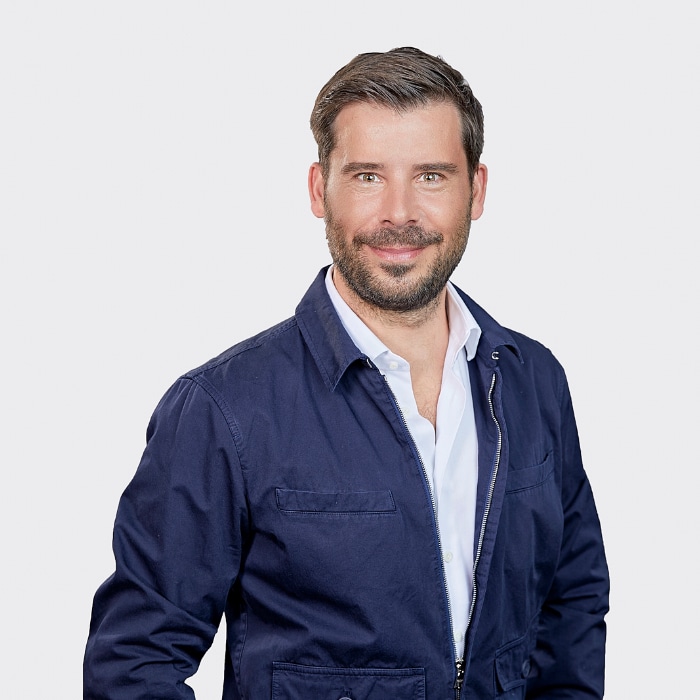1 – Find your message
This narrative should be simple and should be consciously and actively controlled by you again and again.2 – Align your content along this narrative
3 – Always be and stay authentic
4 – Pitch unique speaker content
To get speaker slots at events, you must pitch unique new content that adds value to the event.5 – Learn from the biggest personal brands
We can always draw inspiration from notable personal brands such as Richard Branson and Elon Musk when it comes to shaping our self-image and positioning ourselves on specific topics, as well as the meticulous effort put into building the brand.Personal branding: “Ideally, you will discover an authentic narrative that can be guided and managed.
The concept of personal branding is currently captivating numerous entrepreneurs, as it is progressively perceived as a strategic instrument. Felix Haas, a Partner at 10x Group and FLEX Capital, as well as the Chairman and Host of Bits & Pretzels, unveils his perspective on personal branding and elucidates how he constructed his own brand, in an interview with FLEX Managing Partner Peter Waleczek.
Peter Waleczek: Thank you, Felix, for dedicating your time to discuss personal branding with me. I know only a few individuals who, like you, have succeeded in consecutively establishing multiple businesses and brands. Moreover, you have effectively forged a personal identity as Felix Haas within the realm of entrepreneurship. Kindly provide a brief introduction of yourself.
Felix Haas: Certainly, Peter. I’d be delighted to share my thoughts on personal branding. I must admit that I hadn’t actively prioritized this aspect before. Nevertheless, as I progressed through my entrepreneurial endeavors, I came to the realization that personal branding can serve as a valuable instrument for attaining business objectives.
At a certain juncture in my entrepreneurial journey, I discovered that personal branding can serve as a valuable tool in attaining business objectives.
This process began with the inception of the amiando GmbH. The fact that the founders of amiando and I, as CEOs, were present at numerous events led to an increase in personal recognition. Additionally, our names were frequently mentioned in subsequent angel investments. The compound effect kicked in. This means that the achieved personal visibility sometimes reinforces itself, but you need to steer it in the direction you desire. Due to our recent successful venture, Bits & Pretzels, this personal visibility has naturally grown significantly.
Do you consciously separate your personal from your business branding? Did you, at a certain point, deliberately cultivate your personal image after realizing that it adds value to the company?
Felix Haas: One should consciously separate these aspects. Because there is a risk of falling into the trap of viewing the personal brand as an end in itself. When a personal brand develops positively, it’s emotionally satisfying. However, it can also take a negative turn. That’s why deliberate separation is crucial.
As soon as the topic of personal branding arises, the question of what the goal should be comes into play; what one aims to achieve with it. Certainly, these can be personal goals, such as wanting to represent something specific. However, the most effective goals are likely to be business-oriented. In other words, can increased visibility in the marketing or sales domain yield measurable success?
The prime example in this regard is undoubtedly Elon Musk with Tesla, one of the most successful personal brands ever. However, entrepreneur Richard Branson, who has supported us at Bits & Pretzels, should also be mentioned, as he is on par with Elon Musk in every respect.
It was personally interesting for me to observe how the Virgin Group handles personal branding. In 2016, Branson was a keynote speaker at Bits & Pretzels. It was impressive to witness how his brand is managed. Truly incredible. As organizers, we even had to commission a custom-made pair of leather pants in the colors of the Virgin Group to align with their brand image. I believe that Germany could still learn something from such meticulous branding. Going the extra mile for details can make a difference.
In 2016, Branson was a keynote speaker at Bits & Pretzels. It was impressive to observe how meticulously his brand is managed. Truly incredible. As organizers, we even had to commission a custom-made leather pants in the colors of the Virgin Group to align with their brand image. I believe that Germany could still learn something from such detailed branding.
How did you specifically approach your brand positioning? Why did you choose the events channel for this purpose?
Felix Haas: As I hinted earlier, I honestly never sat down specifically to strategically define my brand positioning. Many decisions were made consciously and unconsciously. After our amiando exit, I positioned myself as a business angel at events and pondered over the label I wanted for myself. In my experience, the most successful brands always have a simplified message.e.
Ideally, through this process, you can discover an authentic narrative that can be guided and directed. For instance, “Felix Haas, Business Angel” or “Peter Waleczek, Managing Partner at FLEX Capital.” Then, you can ensure that this narrative is consistently used in the media. For example, you could request journalists to introduce you as a Business Angel or Managing Partner at FLEX Capital. Similarly, on social media, you can think about what to post in relation to this narrative. To be honest, I often go with my gut feeling when sharing something on social media.
What one should not forget in all of this is that it should also be enjoyable. For instance, I manage my Instagram account @pilothaas. It has nothing to do with business topics and holds no relevance in that context. However, the account brings me personal joy as I share pictures of flying experiences.
After our amiando exit, I positioned myself as a business angel at events and contemplated the label I personally wanted to have. In my experience, the most successful brands always have a simplified message.
Any other tips and learnings you’d like to share?
Felix Haas: Personally, I believe that in certain instances, one should embrace the principle of “just go for it.” It’s also important to always remain authentic. Your own character can naturally shine through—whether you’re more introverted or extroverted, use stronger language, or tend to be reserved. Striving solely for this positioning concept doesn’t really propel you forward, both professionally and personally. Eventually, in my opinion, it leads to losing one’s personal authenticity. Another aspect to consider is adapting to the target audience on business-related social media channels.
Are there also negative aspects of the personal brand for you?
Felix Haas: Certainly. A good example of this is making a statement that unexpectedly attracts criticism from a multitude of people after its release. You need to be able to handle that criticism. Once you’ve built a certain following, you might be inundated with post requests, such as open positions in your company. You should handle these very selectively because it’s easy to lose authenticity and start posting content that’s irrelevant to your target audience. My advice, which is also my personal rule: Just be yourself.
Let’s say I want to be a speaker at events and share a message. How does this work in concrete terms?
Felix Haas: Here I can share my experience from Bits & Pretzels. My suggestion is to approach conference organizers with a specific and unique proposition. Conference organizers are always seeking intriguing individuals and stories that can enrich the event. The key is to offer value to both the conference and the entrepreneurial community through fresh and distinct content. For instance, presenting an unconventional business concept or making an exclusive announcement about exciting company developments could be compelling examples.
Speaker slots are, in my experience, highly effective for building one’s personal brand, whereas panels might have a lesser impact. In panels, there’s often not enough opportunity to effectively position your personal brand.
Felix Haas: A great role model for me is Satya Nadella, the current CEO of Microsoft. Nadella communicates authentically and inspiringly. I believe Nadella’s personal brand has been pivotal for Microsoft as a company.
Who takes care of your social media channels?
Felix Haas: I’m a bit peculiar in that regard, and I handle it personally as an individual because I find it enjoyable. However, I do have a few sparring partners who assist me. Yet, once a company reaches a certain size, it becomes significant to have a team for this kind of work. Once you’ve identified this work as a lever for business goals, it absolutely makes sense to organize a professional team.
Peter Waleczek: Felix, thank you very much for sharing these insightful perspectives about your personal background and the insights into Bits & Pretzels.
Felix Haas: Thank you for the interview as well.












